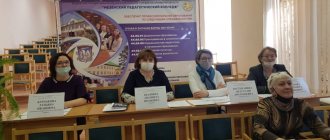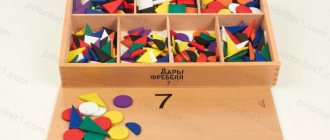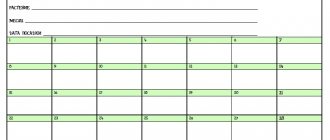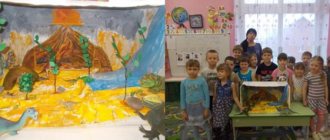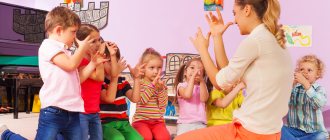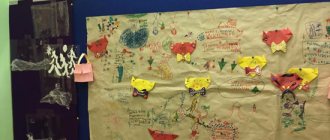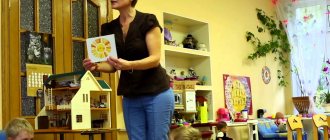Modern preschool teacher article on the topic
Modern preschool teacher
Updating the preschool education system implies the creation of a new type of kindergarten, capable of organizing a unified educational space, proclaiming the idea of the intrinsic value of the preschool period of childhood.
Recognition of the priority of the child’s personality, his right to express his interests, characteristics, and expression in creative self-realization presupposes the formation of a new model of education, where the interests of the preschool child will be taken as the basis. At this stage, there is a reassessment of values and authorities, which leads to an intensive search for modern educational technologies aimed at developing and supporting children's initiative, protecting and strengthening children's health. In confirmation of this, the new regulatory document “Federal state requirements for the structure of the basic general education program of preschool education” defines the basis of the educational program of the kindergarten and puts forward the development of each child as the main goal of educational work.
What should a modern preschool teacher be like?
First of all, it is focused on personal interaction with each student, excluding the authoritarian model of constructing the educational process. Preschool education is entirely built on the process of interaction between the teacher and children, and since the teacher is a fairly significant figure for the child, it is the teacher who bears responsibility for the quality of this process. It follows from this that highly professional teachers should be near the children. It is close to children, because if the child and the teacher are partners and communicate as equals, then this provides the psychological comfort necessary for the child’s full development.
The professionalism of a teacher consists of many components. But it very often happens that the process of raising and teaching children is built into a system that is often clearly planned and strictly regulated, almost completely excluding the creativity of both the teacher and the children. And as a result, children’s proposals, questions, and their moods remain without due attention, since they go beyond the scope of planned activities. A modern teacher must be ready for flexible adjustments to the educational process, based on the interests and needs of students. The goal should not be the formation of knowledge, skills and abilities, but the development of the child’s personality. The main task for a teacher of a modern kindergarten is a gradual departure from stereotypes, the organization of mental activity, during which a reassessment of one’s own professional actions and one’s attitudes towards the child will occur. Only real changes in the consciousness of the teacher will lead us to changes in the entire educational process.
Renewing pedagogical consciousness is a long, complex and painful process. It is important that educators realize the significance of their mission and direct their efforts to the full upbringing and education of children, their psychological protection.
The modern world is characterized by rapidly changing conditions and constant updating of information, therefore another important component of a teacher’s professional competence is the constant improvement of one’s knowledge, mastery of progressive pedagogical technologies of education and training. The decisive factor in the development of a teacher’s personality at all stages of his professional path is continuous self-education. The teacher must have motivation and a need for self-development. In a modern educational institution, conditions must be created for studying best practices, updating knowledge and creatively applying it in practice. The teacher must be capable of self-analysis and self-assessment, perception of new information and introduction into his work of innovative forms of interaction with all participants in the educational process.
Modern information and communication technologies are used in all areas of modern society and place new demands on the quality of education in accordance with the promising and current needs of the individual and society as a whole. Self-organization skills, the ability to analyze and apply the necessary information, skills of effective collective activity are modern requirements for the quality of education. First of all, teachers should own all the benefits of information and communication technologies.
The use of information and communication technologies in the educational process is important for improving the educational system. The use of modern technical means can change the pedagogical process, introducing novelty and variety into it. A modern teacher in his work must use a personal computer with all its enormous potential - this will facilitate some aspects of his teaching activity, and with proper use and a creative approach, he can achieve stunning results - the process of education and learning will be interesting to all participants in the educational process.
It becomes obvious that a teacher who conducts teaching activities using a multimedia projector, computer, navigates the information space, has a qualitative advantage over colleagues who operate only within the framework of traditional technologies.
One of the main conditions for the use of information and communication technologies in kindergarten is that children should be worked with by competent specialists who not only have computer skills and know their technical capabilities, but also strictly follow sanitary standards and rules for using computers, and are familiar with the methods of introducing children to new information technology. Taking this into account, the teacher must be computer literate, master working with educational software systems, and the resources of the global information network Internet in order to be able to use modern computer technologies to interact with students and their parents at a qualitatively new level.
Thus, a modern kindergarten needs a teacher who will not be a “teacher”, but a senior partner for children, contributing to the development of the students’ personalities; a teacher who is able to competently plan and build the educational process, focusing on the interests of the children themselves, but at the same time not be afraid to deviate from the planned plan and adapt to real situations; a teacher who can independently make decisions in a situation of choice, predicting their possible consequences, as well as capable of cooperation, possessing psychological and pedagogical knowledge, modern information and communication technologies, capable of self-education and introspection.
A modern teacher is, first of all, an independent, creative and self-confident person. You need to prepare for such a role, because performing in it is not easy.
Bibliography:
- Lukina L.I. Organizational aspects of working with teaching staff of preschool educational institutions. Moscow: Sphere shopping center. 2010
- Miklyaeva N.V., Miklyaeva Yu.V. Diagnostics and development of professional skills of teachers in preschool educational institutions. Moscow: Iris press. 2008
- Nikishina I.V. Diagnostic and methodological work in preschool educational institutions. Volgograd: Teacher. 2007
- Management of a preschool educational institution. – 2010 – No. 1
Professional competence of a preschool teacher; methodological development
“Professional competence of a preschool teacher”
1. Competence: definition and main components.
In accordance with the Federal State Educational Standard, an educational program for preschool education has been developed and implemented, which contains not only a mandatory part, but also a part formed by participants in educational relations, and also includes inclusive education and takes into account the ethnocultural situation. The implementation of this new general education program involves relying on the professional competence of the educator.
Competence is the personal ability of a specialist to solve a certain class of professional tasks. Competence is also understood as formally described requirements for the personal, professional, etc. qualities of the company’s employees (or for some group of employees).
Competence is also considered as a basic quality of an individual, which includes a set of interrelated personality qualities necessary for high-quality productive activity. Professional competence is the ability to successfully act on the basis of practical experience, skills and knowledge in solving professional problems.
Pedagogical competence is understood as a systemic phenomenon, the essence of which lies in the systemic unity of pedagogical knowledge, experience, properties and qualities of a teacher, which allows for the effective implementation of pedagogical activities, purposefully organizing the process of pedagogical communication and also implying the personal development and improvement of the teacher.
A teacher of a preschool educational institution (hereinafter referred to as the preschool educational institution) must be competent in the organization and content of activities in three main areas and demonstrate specific indicators of competence in each area (Table 1).
Table 1 Competency criteria by area of activity
| Direction | Competence criteria | Competency indicators |
| Educational activities | ∙ implementation of a holistic pedagogical process; ∙ creation of a development environment; ∙ ensuring the protection of the life and health of children. | — knowledge of the goals, objectives, content, principles, forms, methods and means of teaching and educating preschool children; — the ability to effectively generate knowledge; — skills and abilities in accordance with the educational program; - ability to manage the main activities of preschoolers; - ability to interact with preschoolers. |
| Educational and methodological activities | ∙ planning educational work; ∙ designing teaching activities based on analysis of achieved results. | — knowledge of the educational program and methods of developing various types of children’s activities; — the ability to design, plan and implement a holistic pedagogical process; – mastery of technologies for research, pedagogical monitoring, education and training of children. |
| Social and pedagogical activities | ∙ advisory assistance to parents; ∙ creating conditions for the socialization of children; ∙ protection of the interests and rights of children. | — knowledge of basic documents about the rights of the child and the responsibilities of adults towards children; — ability to conduct explanatory pedagogical work with parents and preschool educational institutions specialists. |
The main components of a teacher’s professional competence include:
∙ intellectual and pedagogical competence – the ability to apply acquired knowledge, experience in professional activities for effective teaching and education, the teacher’s ability to innovative activities;
∙ information competence – the amount of information a teacher has about himself, students, parents, and colleagues;
∙ regulatory competence – the teacher’s ability to manage his behavior, control his emotions, ability to reflect, stress resistance;
∙ communicative competence is a significant professional quality, including speech skills, listening skills, extraversion (the quality of a person characterized by great interest in the outside world), empathy (empathy, understanding of another).
The ability to communicate correctly with parents of students is one of the main and can be difficult professional competencies.
The professional competence of a teacher is a multifactorial phenomenon that includes a system of theoretical knowledge of the teacher and ways of applying it in specific pedagogical situations, the value orientations of the teacher, as well as integrative indicators of his culture (speech, communication style, attitude towards himself and his activities, towards related areas knowledge, etc.). In accordance with the definition of the concept of “professional competence,” it is proposed to assess the level of professional competence of teaching staff using three criteria:
1) mastery of modern pedagogical technologies and their application in professional activities;
2) willingness to solve professional subject problems;
3) the ability to control their activities in accordance with accepted rules and regulations.
Thus, the professional competence of a teacher is characterized as the general ability of a teacher to mobilize his knowledge and skills. A consistently high level of professional competence can be achieved through continuous education. What comes to the fore is not formal membership in a profession, but professional competence, that is, the specialist’s compliance with the requirements of professional activity. The formation of professional pedagogical competence is a process that continues throughout the entire professional path; according to this, constant incompleteness is one of the characteristics of a teacher’s professional competence. Work experience has a great influence on the formation of professional pedagogical competence.
2. Ways to develop the professional competence of a preschool teacher.
The main professional task of a teacher is to create conditions for the harmonious development of children. To do this, a preschool teacher must have the following professional competencies:
1) respectful attitude towards each child, his feelings and needs;
2) the ability to communicate with each child;
3) the ability to create conditions for children to freely choose activities and participants in joint activities;
4) the ability to create conditions for children to make decisions, express their feelings and thoughts;
5) the ability to provide non-directive assistance to children, support children's initiative and independence in various types of activities;
6) the ability to create conditions for positive, friendly relationships between children, including those belonging to different national, cultural, religious communities and social strata, as well as those with different (including limited) health capabilities;
7) the ability to develop children’s communication abilities, allowing them to resolve conflict situations with peers;
 the ability to create conditions for mastering cultural means of activity;
the ability to create conditions for mastering cultural means of activity;
9) the ability to organize activities that promote the development of thinking, speech, communication, imagination and children's creativity, personal, physical and artistic-aesthetic development of children;
10) the ability to assess the individual development of each child;
11) the ability to interact with parents on issues of the child’s education, to involve them in educational activities, including through the creation of educational projects together with the family.
For the high-quality formation of a teacher’s competence, basic knowledge, skills, and abilities are required, which will be improved in the process of self-education.
But none of the listed methods will be effective if the teacher himself does not realize the need to improve his own professional competence. Only a teacher who is ready for change, who is personally developing in the profession, who has a high level of knowledge and skills, reflection, and a developed ability for design activities, that is, a professionally competent teacher, can prepare children for change.
The basic education received by a teacher creates only the prerequisites for the formation of professional competence. In addition, recently there has been a tendency to increase the number of educators without special preschool education, educators whose professional training does not meet modern requirements of preschool education, and educators with established pedagogical stereotypes.
Practice shows that in order to carry out one’s activities at a high professional level, to apply pedagogically sound forms, methods of teaching and education that ensure high quality education, it is necessary to improve one’s professional level.
The demands of the modern world are such that knowledge acquired once is not enough. It is necessary to improve your professional competence. The main ways to develop professional competence include:
- refresher courses,
- internship,
- research, experimental activities,
— active participation in pedagogical competitions, master classes,
— participation in methodological associations,
- generalization of teaching experience,
- self-education.
Particular attention should be paid to the last resource. Self-education, an integral part of the continuous education system, acts as a link between basic education and periodic advanced training.
Most educators cannot (and in some cases do not want) to independently improve their professionalism. External factors have an impact (wages, material and technical equipment, work overload, everyday difficulties, etc.), but there are also subjective reasons that depend on the teachers themselves. They lack persistence, determination, and self-educational skills.
Therefore, it is very important to understand the importance of self-education and strive for your own development. As K.I. Chukovsky said, “Only that knowledge is durable and valuable that you have acquired yourself, prompted by your own passion...”.
Self-education is a purposeful cognitive activity controlled by the individual himself, the acquisition of systematic knowledge in any area. The criteria for self-education are:
— effectiveness of professional activities,
- creative growth of the teacher,
— introduction of new pedagogical technologies into the educational process.
There are various forms of self-education: studying literature, reviewing information on the Internet, listening to lectures, reports, consultations, attending seminars, conferences, trainings, as well as practical activities.
Table 2 Development of professional competence of a preschool teacher
| Form | Target | results |
| Refresher courses | development of professional skills, professional culture, development of new professional competencies, updating of theoretical and practical knowledge | development of management skills, study and analysis of new regulatory documents, assistance in determining the content of self-education, providing assistance and support in preparing for certification and introducing innovations into the educational process |
| Internship | formation and development of professional competencies | improving knowledge and skills, mastering innovative technologies, forms, methods and means, developing specific proposals for improving activities, familiarizing with advanced technologies, developing proposals for improvement |
| Research, experimental activities | formation in the course of experimental work of new characteristics of subjects (objects) of education, new conditions for improving the quality and accessibility of education | development of research competence of teachers and students, personal growth of teachers and children, increasing the level of knowledge and erudition |
| Active participation in pedagogical competitions, master classes | creation of conditions for professional self-improvement, formation of an individual style of a teacher | formation of motivation and cognitive need for specific activities, stimulation of interest, development of conditions for planning, self-organization and self-control |
| Participation in methodological associations | formation of the need for professional growth | Sharing knowledge, providing assistance, developing common requirements, improving the quality of education |
| Generalization of teaching experience | gaining knowledge from experience that differs from mass positive ones by high efficiency and optimality | compliance of the level of education and training of students, improvement of methodological work and management activities |
From the standpoint of the competency-based approach, the level of education of teachers is determined by the ability to solve problems of varying complexity based on existing knowledge, while it must be taken into account that the competency-based approach does not deny the importance of knowledge that has different values, and an increase in its volume does not mean an increase in the level of education. The competency-based approach is considered as an approach that orients the educational process towards the practicality of its results, in which a person’s ability to act in various problem situations is considered as a result, and the results of education are recognized as significant.
The specificity of a teacher’s professional activity lies in the fact that the invariant requirements and characteristics of professional activity are enriched by distinctive features: the age characteristics of preschool children, the uniqueness of the organization of activities, the nature of the interaction between children and preschool employees.
The key to professional growth of a teacher is the constant desire to improve skills. Professional skill is achieved only through constant work. The demand for lifelong learning is not new to educators. However, today it has received a new meaning. The teacher must not only monitor and study the rapidly occurring changes in the professional industry, but also master modern pedagogical technologies. Mastering technology is associated with a change in pedagogical thinking. From a psychological point of view, this requires significant effort, mobilization of human resources and abilities.
3. Educator in modern conditions.
In the practice of functioning of preschool educational institutions, the main contradiction stands out, which consists in the discrepancy between the level of professional and pedagogical preparedness of a modern teacher, his personal professional potential and the requirements placed on him. This contradiction means that at the present stage there is a need for qualitatively different requirements for the competencies of preschool teachers, allowing one to combine professional basic knowledge with innovative thinking and a practice-oriented, research approach to solving specific educational problems. And then we will “get” the Educator of the 21st century. What is meant by this high title? The educator of our time is:
∙ a harmoniously developed, internally rich personality, striving for spiritual, professional, general cultural and physical perfection;
∙ able to select the most effective methods, means and technologies of training and education for the implementation of assigned tasks;
∙ able to organize reflexive activity;
∙ possessing a high degree of professional competence.
In addition to the main components of a teacher’s professional competence mentioned in the first paragraph, the following types of competencies necessary for a teacher of the new generation are also distinguished:
1) competence in conducting the educational process. Preparation for educational activities necessitates high competence and a constant search for new information. Deep knowledge of preschool pedagogy, basic methods of raising and teaching preschool children with practical application. Using a variety of teaching methods, activities and materials that are developmentally appropriate for children. Using diagnostic tools.
2) competence in organizing the information basis for the activities of students. Preparation for educational activities necessitates high ICT competence and a constant search for new information.
3) competence in organizing educational work. Recognition of children's right to choose (activities, partners). Creating opportunities for its implementation. Modeling compassionate attitudes and positive communication styles with an emphasis on problem and conflict resolution. Show respect for each child's thoughts and judgments.
4) competence in establishing contacts with parents. This competence will allow the educator to involve parents and members of the public in the joint formation of criteria for the quality of education, to specify the social order, and to make the preschool educational institution attractive for investment.
5) competence in building an individual educational route for students. Organization of own pedagogical activities, focused on the individual characteristics of the child. Possession of means of diagnosing the individual characteristics of a child and the characteristics of a group. Defining individual goals for the short and long term.
6) competence in the development and implementation of proprietary educational programs. This competence helps to expand the content of education in a specific field of knowledge, realize creative potential and develop students’ interest in a certain type of activity.
7) competence in mastering modern educational technologies. Allows for a competency-based approach in education. Promotes the development of generalized methods of activity for pupils, allowing them to freely navigate in various life situations.
 competence of professional and personal improvement. Ensures constant growth and creativity in teaching activities, involves continuous updating of one’s own knowledge and skills, which ensures the need for constant self-development.
competence of professional and personal improvement. Ensures constant growth and creativity in teaching activities, involves continuous updating of one’s own knowledge and skills, which ensures the need for constant self-development.
9) creative competence of the teacher. To assess this direction, one should take into account how different the teacher is in his ability to search for and implement new pedagogical ideas and new ways of solving pedagogical problems into practice. A positive attitude towards new ideas, the desire to put them into practice on one’s own initiative, without the influence of the administration. Demonstration of competence in generalizing and disseminating teaching experience.
10) competence in organizing health-preserving conditions for the educational process. This competence will ensure the presence of a criterion for a new quality of education - the creation of conditions for preserving the health of all participants in the educational process.
11) competence in creating a subject-spatial environment. This competence allows for the organization of children's communities and the stimulation of children's self-regulation processes, providing them with materials, time and space to choose and plan their own activities.
Teachers with a sufficient level of internal motivation, creative individuals, oriented to success, are able to independently achieve a high level of professionalism. However, for the majority of teachers it is necessary to create special conditions. Not every teacher can rise to the pinnacle of innovation. But everyone can join the creative search for optimal means, forms, methods of teaching and raising children.
Good professional knowledge, developed teaching abilities, skills in the field of pedagogy, constant work on oneself - these are the necessary conditions for a teacher to achieve high professional skills.
Thus, the concept of teacher competence is understood as a value-semantic attitude towards the goals and results of teaching activities, expressed in the conscious performance of professional functions. And this is especially valuable, given that such a position of a teacher is not an innate quality; it is formed under the influence of the entire educational environment, including in the process of additional professional education aimed at changing the inner world that determines the awareness of the actions of a kindergarten teacher.
